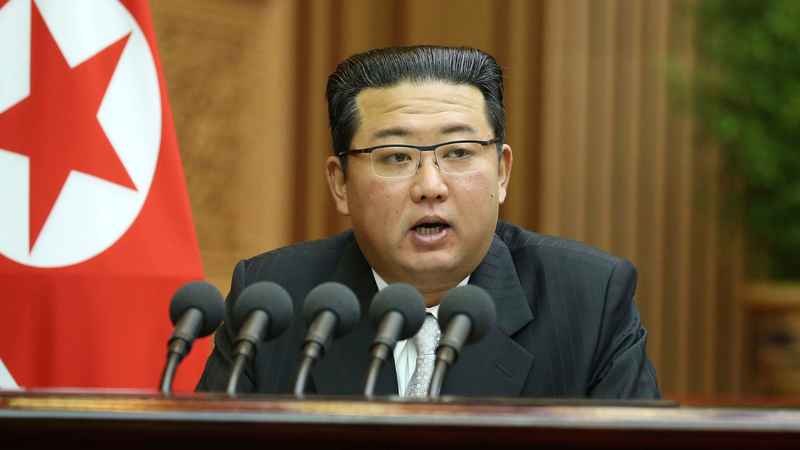North Korea’s Kim wants to restore hotlines with South Korea soon

In this photo provided by the North Korean government, North Korean leader Kim Jong Un speaks during a parliament meeting in Pyongyang, North Korea Wednesday, Sept. 29, 2021. Independent journalists were not given access to cover the event depicted in this image distributed by the North Korean government. The content of this image is as provided and cannot be independently verified.[Korean Central News Agency/Korea News Service via AP]
North Korea leader Kim Jong Un expressed his willingness to restore stalled communication lines with South Korea to promote peace in early October, while he shrugged off recent U.S. offers for dialogue by calling them “more cunning ways” to conceal its hostility against the North, state media reported Thursday.
Kim’s statement is an apparent effort to drive a wedge between Seoul and Washington as he wants South Korea to help him win relief from crippling U.S.-led economic sanctions and other concessions. In recent days, Pyongyang offered conditional talks with Seoul though it performed a series of missile tests in its first weapons firings in six months and stepped up its criticism of the United States.
The U.N. Security Council scheduled an emergency closed meeting on Thursday at the request of the United States, United Kingdom and France on North Korea’s recent tests, including its first reported hypersonic missile test on Tuesday.
During a speech at his country’s rubber-stamp parliament on Wednesday, Kim said the restoration of cross-border hotlines — which have been largely dormant for more than a year — would realize the Korean people’s wishes for a peace between the two Koreas, according to the official Korean Central News Agency.
Kim still accused South Korea of being “bent on begging external support and cooperation while clamoring for international cooperation in servitude to the U.S.,” rather than committing to resolving the matters independently between the Koreas.
Kim repeated his powerful sister Kim Yo Jong’s calls for Seoul to abandon “double-dealing attitude” and “hostile viewpoint" over the North’s missile tests and other developments, saying the fate of inter-Korean ties is at a critical juncture. Some experts say North Korea is pressuring South Korea to tone down its criticism of its ballistic missile tests, which are banned by U.N. Security Council resolutions, in a bid to receive an international recognition as a nuclear power.
On the United States, he dismissed repeated U.S. offers to resume talks without preconditions, calling them an attempt to hide America’s “hostile policy” and “military threats” that he said remain unchanged.
The Biden administration "is touting ‘diplomatic engagement’ and ‘dialogue without preconditions’ but it is no more than a petty trick for deceiving the international community and hiding its hostile acts and an extension of the hostile policy pursued by the successive U.S. administrations,” Kim said.
He added: "The U.S. remains utterly unchanged in posing military threats and pursuing hostile policy toward (North Korea) but employs more cunning ways and methods in doing so.”
North Korea has long called U.S.-led economic sanctions on it and regular military drills between Washington and Seoul as proof of U.S. “hostile policies” on them. Kim Jong Un has said he would bolster his nuclear arsenal and not resume nuclear diplomacy with Washington unless such U.S. hostility is withdrawn.
U.S. officials have repeatedly expressed hopes to sit down for talks with North Korea “anywhere and at any time,” but have maintained they will continue sanctions until the North takes concrete steps toward denuclearization. The diplomacy has been stalled for 2 ½ years due to disagreements over easing the U.S.-led sanctions in return for limited denuclearization steps.
Prior to North Korea’s claimed hypersonic weapon test, North Korea test-launched a newly developed cruise missile and a ballistic missile from a train, a new launch platform, earlier this month. Both missiles are nuclear-capable and their flight tests demonstrated North Korea’s ability to attack targets in South Korea and Japan, both key U.S. allies where a total of 80,000 American troops are stationed.
Kim said in his parliament speech that “a spur has been given to … developing a powerful new weapon system capable of thoroughly containing the military moves of the hostile forces.” He accused the United States and its “vassal forces” of creating a “’neo-Cold War” and ordered officials to work out “tactical measures” on U.S. relations.
Kim Jong Un has still maintained a moratorium on testing a longer-range missile capable of reaching the American homeland, an indication he wants to keep the chances for future diplomacy with the U.S. alive.
Nearly 10 years in office, Kim Jong Un faces what he calls “the worst-ever” crisis due to a combination of the coronavirus pandemic, the U.S.-led sanctions and natural disasters. In his latest speech, Kim claimed progress in national efforts to salvage the troubled economy but urged stronger efforts to tighten epidemic prevention measures and fulfill other objectives set during a January ruling party congress.